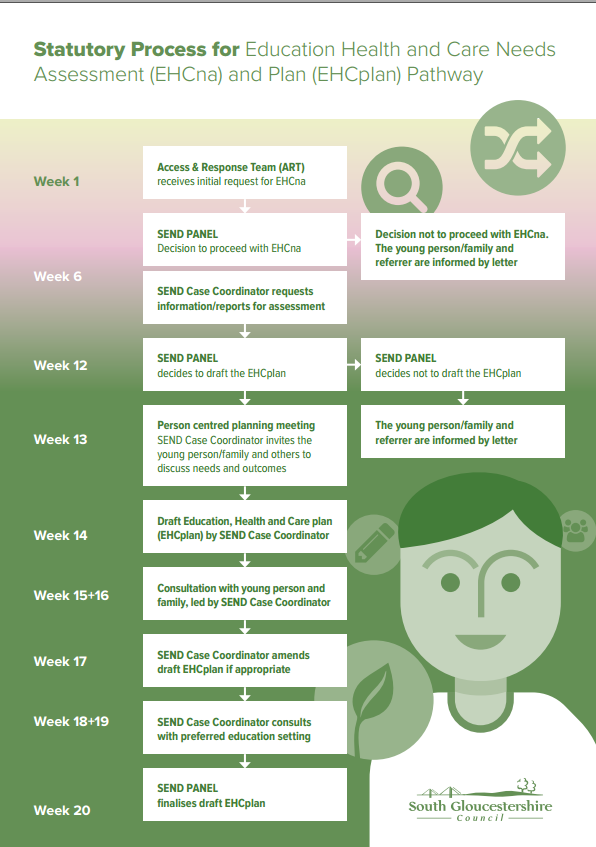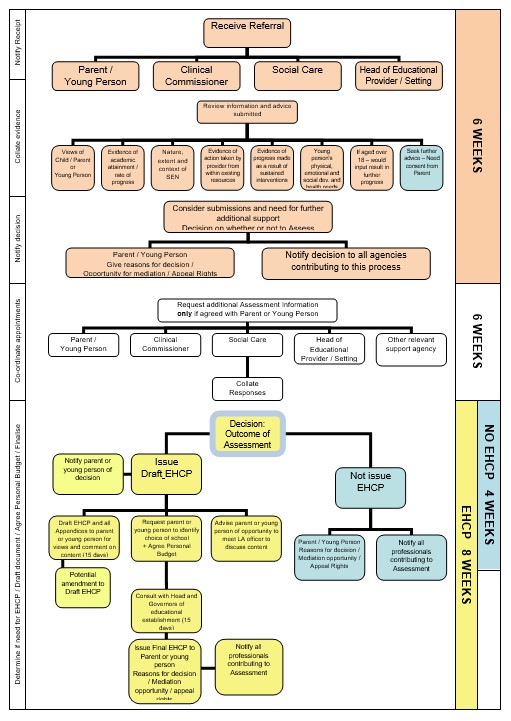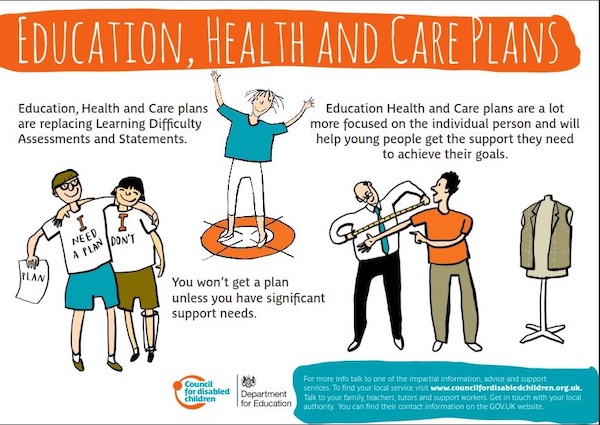EHC Plans: What teacher's need to know
EHC Plans: The process and timelines involved with getting the support your school needs.


An Education, Health, and Care (EHC) plan is a legally binding document designed to support children and young people with special educational, health, and social care needs. It outlines their specific requirements, the tailored support they will receive, and how this support will help them achieve their personal and educational goals. Developed collaboratively by parents, educators, therapists, and school administrators, an EHC plan serves as a comprehensive roadmap for the child's development and well-being.
Creating an effective EHC plan requires careful consideration of several factors: identifying the child’s unique needs, determining the types of additional support or specialized therapies required, and ensuring appropriate accommodations for accessing the general curriculum. Teachers and school staff often play a pivotal role in early identification of challenges, offering crucial insights into a child’s needs. By working together, families and professionals can create a plan that ensures the child’s academic, social, and emotional success.
This article will delve into the components of an EHC plan, the assessment process, and practical strategies for making the curriculum more accessible in mainstream school settings.
EHC plans are for young people and children whose special academic needs require more assistance than the children normally get in mainstream schools, specialist colleges or any other educational settings.
Although the EHC plan may include social care or health needs, a child may not fulfil eligibility criteria for the plan if he/ she only needs help with health and care needs such as feeding difficulties and not education.
A child or a young person can be issued an EHC plan from 0 to 25 years.

EHC plans are formulated by the local authority after carrying out a formal assessment of EHC needs. Parents, a child’s current education setting or a person himself (if aged 16+), can request for assessment to the local authority, which has the responsibility to conduct an assessment process for education health and care needs.
An EHC plan does not follow any national standard format. But, it needs to have some clearly defined sections, including:

The local authority carries out an annual review of the EHC plan. After reviewing the EHC plan, the local authority may decide to continue the same plan, end it or make changes in the plan.
For the majority of children, the EHC plan remains in place until they complete their education at the current school or education setting or until the local authority decides that a child does not need the plan to help in his educational provision anymore. If the person shifts to a new local authority, his EHC plan will be transferred as well.
An EHC needs assessments are amongst the foremost steps to obtaining an EHC plan. It involves a legal process to fill an assessment form, performed by the local authority. It is different from the other assessments carried out by the teachers, GP or any other professional. The main purpose of an EHC needs assessment is to assess how much education health and care a child needs.
The local authority collects details to make an education health and care plan for students' needs with the help of:
For anyone aged 14 or above, the advice about independent living and preparing for adulthood.
The local authority gives them six weeks to provide all the details requested by them.
The local authority would not ask for any additional details from professionals if the details have been provided recently. But, the existing reports must provide all the necessary details about the child. The reports must contain essential details about a child’s needs, the health care provisions or support a child may require, and the expected results (how the provision would be beneficial for the child).
The parents and child can seek help from the local authority to take part in the child's EHC needs assessments process. The local authority must offer the desired help one may need in providing the correct details, suggestions and support in this process.
If a child's details have already been provided as part of the local authority's request, there is no need to provide the details again. However, if parents wish to add more details they can do, such as reports from special schools or independent health visitor. It is also possible to provide contact details of any professional, who has not been contacted as yet. For instance, it is possible to ask for a child's assessment from any speech or language therapist.
As part of the EHC needs assessments, the local authority will collect details about the child’s health and care needs. If the family is not already receiving any assistance from children’s services, they can ask the local authority to carry out a new assessment and then decide if the child needs support in the house or the community.

If the local authority agrees on issuing an EHC plan, they will send a draft plan. The family or the child gets 15 days to respond to it and put forward their views to the local authority concerning the contents of the draft EHC plan. The final EHC plan is usually issued within 20 weeks of the initial EHC plan request.
The local authority may decline the request to assess if they think the child does not need an assessment. They may feel that mainstream schools would more effectively provide the desired support to a child's everyday life needs or they may think that there is insufficient evidence to prove that the learning difficulties of the child are severe enough. If a request for the health and care needs assessment has been declined, one may appeal to an autonomous tribunal within 4 to 8 weeks of the EHC needs assessment decision.
An EHC plan identifies educational, health and care needs and ensures the delivery of additional support to address those needs. An education, health and care (EHC) plan is a great way to support children and young people aged up to 25 through special educational needs support. It provides children with the desired support needed to meet their SEN, going further what the school can offer and providing additional and assistive resources to enhance the quality of their learning experience.
Once an EHC plan is in place, senior leadership teams must ensure that it is implemented effectively and that its outcomes are carefully monitored to support the child’s ongoing development. The success of an EHC plan relies not just on the quality of its initial design but also on the processes for reviewing and adapting it to meet the child’s evolving needs. Here are the key considerations for school leadership teams:
By focusing on these areas, senior leaders can ensure that EHC plans remain dynamic, responsive, and truly centered on the needs of the child. This proactive approach fosters an inclusive school environment where every learner has the opportunity to thrive.
An Education, Health, and Care (EHC) plan is a legally binding document designed to support children and young people with special educational, health, and social care needs. It outlines their specific requirements, the tailored support they will receive, and how this support will help them achieve their personal and educational goals. Developed collaboratively by parents, educators, therapists, and school administrators, an EHC plan serves as a comprehensive roadmap for the child's development and well-being.
Creating an effective EHC plan requires careful consideration of several factors: identifying the child’s unique needs, determining the types of additional support or specialized therapies required, and ensuring appropriate accommodations for accessing the general curriculum. Teachers and school staff often play a pivotal role in early identification of challenges, offering crucial insights into a child’s needs. By working together, families and professionals can create a plan that ensures the child’s academic, social, and emotional success.
This article will delve into the components of an EHC plan, the assessment process, and practical strategies for making the curriculum more accessible in mainstream school settings.
EHC plans are for young people and children whose special academic needs require more assistance than the children normally get in mainstream schools, specialist colleges or any other educational settings.
Although the EHC plan may include social care or health needs, a child may not fulfil eligibility criteria for the plan if he/ she only needs help with health and care needs such as feeding difficulties and not education.
A child or a young person can be issued an EHC plan from 0 to 25 years.

EHC plans are formulated by the local authority after carrying out a formal assessment of EHC needs. Parents, a child’s current education setting or a person himself (if aged 16+), can request for assessment to the local authority, which has the responsibility to conduct an assessment process for education health and care needs.
An EHC plan does not follow any national standard format. But, it needs to have some clearly defined sections, including:

The local authority carries out an annual review of the EHC plan. After reviewing the EHC plan, the local authority may decide to continue the same plan, end it or make changes in the plan.
For the majority of children, the EHC plan remains in place until they complete their education at the current school or education setting or until the local authority decides that a child does not need the plan to help in his educational provision anymore. If the person shifts to a new local authority, his EHC plan will be transferred as well.
An EHC needs assessments are amongst the foremost steps to obtaining an EHC plan. It involves a legal process to fill an assessment form, performed by the local authority. It is different from the other assessments carried out by the teachers, GP or any other professional. The main purpose of an EHC needs assessment is to assess how much education health and care a child needs.
The local authority collects details to make an education health and care plan for students' needs with the help of:
For anyone aged 14 or above, the advice about independent living and preparing for adulthood.
The local authority gives them six weeks to provide all the details requested by them.
The local authority would not ask for any additional details from professionals if the details have been provided recently. But, the existing reports must provide all the necessary details about the child. The reports must contain essential details about a child’s needs, the health care provisions or support a child may require, and the expected results (how the provision would be beneficial for the child).
The parents and child can seek help from the local authority to take part in the child's EHC needs assessments process. The local authority must offer the desired help one may need in providing the correct details, suggestions and support in this process.
If a child's details have already been provided as part of the local authority's request, there is no need to provide the details again. However, if parents wish to add more details they can do, such as reports from special schools or independent health visitor. It is also possible to provide contact details of any professional, who has not been contacted as yet. For instance, it is possible to ask for a child's assessment from any speech or language therapist.
As part of the EHC needs assessments, the local authority will collect details about the child’s health and care needs. If the family is not already receiving any assistance from children’s services, they can ask the local authority to carry out a new assessment and then decide if the child needs support in the house or the community.

If the local authority agrees on issuing an EHC plan, they will send a draft plan. The family or the child gets 15 days to respond to it and put forward their views to the local authority concerning the contents of the draft EHC plan. The final EHC plan is usually issued within 20 weeks of the initial EHC plan request.
The local authority may decline the request to assess if they think the child does not need an assessment. They may feel that mainstream schools would more effectively provide the desired support to a child's everyday life needs or they may think that there is insufficient evidence to prove that the learning difficulties of the child are severe enough. If a request for the health and care needs assessment has been declined, one may appeal to an autonomous tribunal within 4 to 8 weeks of the EHC needs assessment decision.
An EHC plan identifies educational, health and care needs and ensures the delivery of additional support to address those needs. An education, health and care (EHC) plan is a great way to support children and young people aged up to 25 through special educational needs support. It provides children with the desired support needed to meet their SEN, going further what the school can offer and providing additional and assistive resources to enhance the quality of their learning experience.
Once an EHC plan is in place, senior leadership teams must ensure that it is implemented effectively and that its outcomes are carefully monitored to support the child’s ongoing development. The success of an EHC plan relies not just on the quality of its initial design but also on the processes for reviewing and adapting it to meet the child’s evolving needs. Here are the key considerations for school leadership teams:
By focusing on these areas, senior leaders can ensure that EHC plans remain dynamic, responsive, and truly centered on the needs of the child. This proactive approach fosters an inclusive school environment where every learner has the opportunity to thrive.